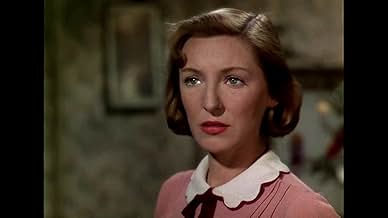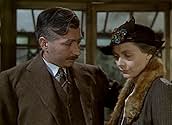AVALIAÇÃO DA IMDb
7,3/10
4,4 mil
SUA AVALIAÇÃO
Adicionar um enredo no seu idiomaA chronicle of the lives of the Gibbons family, from shortly after the end of World War I to the beginning of World War II.A chronicle of the lives of the Gibbons family, from shortly after the end of World War I to the beginning of World War II.A chronicle of the lives of the Gibbons family, from shortly after the end of World War I to the beginning of World War II.
- Direção
- Roteiristas
- Artistas
- Prêmios
- 1 vitória no total
Robin Burns
- Man in Crowd
- (não creditado)
Mabel Etherington
- Lady in Crowd
- (não creditado)
Dan Lester
- Man in Crowd
- (não creditado)
Jim Morris
- Man Operating Small Boats at Fairground
- (não creditado)
Avaliações em destaque
This film by David Lean takes us on a journey from 1919 after the First World war towards into WW2. But focuses not on the fighting, but on the home front, and the effects of a changing world.
I love this films ability to take you along with the day to day routine of a large, close knit family. Youre there with their smiles and tears then then in an instant you feel the heartache of their tragedy.
Robert Newton has never been better - a truly mesmerising performance. Forget Long John Silver (although another very fine performance).
The rest of the cast are a brilliant complement to Robert Newton. John Mills is on top form in a cameo performance.
Did David Lean ever make a bad film?
The only down side to the film is you see how great the British Film Industry once was, and now its virtually gone.
I love this films ability to take you along with the day to day routine of a large, close knit family. Youre there with their smiles and tears then then in an instant you feel the heartache of their tragedy.
Robert Newton has never been better - a truly mesmerising performance. Forget Long John Silver (although another very fine performance).
The rest of the cast are a brilliant complement to Robert Newton. John Mills is on top form in a cameo performance.
Did David Lean ever make a bad film?
The only down side to the film is you see how great the British Film Industry once was, and now its virtually gone.
Whether or not, one agrees with the "truth or morality" of Noel Coward's ennobling view of the British "bourgeois" from 1919-1939, the acting and direction in "This Happy Breed", are superb, and what a cast. I think the notion of sacrifice, pride, and work ethic, might have easily been written about many similar low and middle income families in America from Brooklyn to San Francisco, during the same period, as it was portrayed in the equally, excellent film, "Best Years of our Lives" (1946)
Old-fashioned? Arch dialogue? Stiff acting? Viewable only as an historical document? Guilty on all counts, but this film still captivates. Made during the second World War, it was probably intended as a flag-waver, a morale booster for the worn-down citizens of Britain, but in fact is much more than that. The story (Noel Coward) deals with the lives and times of an ordinary family in 'between the wars' London. There is nothing dramatic, just the everyday events and the weddings, births and funerals that visit us all. However, there are some wonderfully quiet scenes - the father-to-son talk before the son's wedding is especially notable for its old-fashioned moral uprightness, the way the camera lingers in an empty room when the family learns of a terrible road accident, and Frank's gentle chat with his neighbour over a few glasses of whisky as they prepare to go their separate ways. Director David Lean handles these with care and reserve. The way the family deals with the mini-dramas that beset them was no doubt meant to say to the war-weary people that we may be a middling, grey little society with predictable ways, but it was worth fighting for. The film always leaves me a little melancholy, missing an age that still existed in many ways when I was a youngster. No doubt to a modern cinema audience that can't manage without an explosion or car-chase every ten minutes this would be regarded as dull and boring, but I love its charm.
This film caught me completely unawares. I had never heard of it until it presented itself on daytime television one afternoon. I really dislike this type of film, as I find most of the time is spent on mediocre happenings in predictable situations. (Ordinary peoples lives are very boring). I was therefore amazed at the fact that I couldn't leave it, Maybe it's because I am getting older or maybe the people in this film reminded me of the adults of the 1950's when I was a child.
The acting is absolutely superb, you really believe in this family and the ups and downs of their lives. The direction of David Lean polishes the excellent cast performance, what more can I say ! ......Fantastic.....
The acting is absolutely superb, you really believe in this family and the ups and downs of their lives. The direction of David Lean polishes the excellent cast performance, what more can I say ! ......Fantastic.....
London between the wars, as seen by a couple of old soldier comrades from 1914-18. Robert Newton is one of them, married to an odd-accented Celia Johnson, with troublesome kids and a spinster relation to support. Stanley Holloway is the other and somehow is the father of the ubiquitous John Mills.
Noel Coward and David Lean worked together to bring their saga into our hearts and minds, as we rejoice in the good times and empathise with the bad ones. It may be hokum, but some of it works.
The best scenes are the quiet ones - especially the scene without dialogue where mum and dad react to bad news. Newton and Johnson also have considerable rapport in their scenes which works well.
Noel Coward and David Lean worked together to bring their saga into our hearts and minds, as we rejoice in the good times and empathise with the bad ones. It may be hokum, but some of it works.
The best scenes are the quiet ones - especially the scene without dialogue where mum and dad react to bad news. Newton and Johnson also have considerable rapport in their scenes which works well.
Você sabia?
- CuriosidadesThe voice of the uncredited opening narrator is that of Laurence Olivier.
- Erros de gravaçãoFrank is shown reading a copy of the 16 September 1930 edition of the Daily Mirror with the headline story about the elections in Germany held on 14 September where the Nazi Party increased their seats in the Reichstag from 12 to 107. He then goes to the back yard to help shake out the tablecloth, but the cherry tree there is still in full bloom, months after the blossoms should have disappeared.
- Citações
Frank Gibbons: She didn't pass on, pass over, or pass out! She died!
- Cenas durante ou pós-créditosOpening credits prologue: This is the story of a London family from 1919 to 1939.
- ConexõesFeatured in Jonathan Ross' Must-Watch Films: Crime Films (2023)
- Trilhas sonorasRule Britannia
(uncredited)
Lyrics by James Thomson
Music by Thomas Augustine Arne
Sung by Robert Newton (Frank) and Stanley Holloway (Bob) coming home after their reunion
Principais escolhas
Faça login para avaliar e ver a lista de recomendações personalizadas
- How long is This Happy Breed?Fornecido pela Alexa
Detalhes
- Data de lançamento
- País de origem
- Idioma
- Também conhecido como
- This Happy Breed
- Locações de filme
- Alderbrook Road, London, Greater London, Inglaterra, Reino Unido(exteriors of family house near corner with Bellamy St. - still standing in 2022)
- Empresas de produção
- Consulte mais créditos da empresa na IMDbPro
Bilheteria
- Orçamento
- £ 200.000 (estimativa)
- Faturamento bruto mundial
- US$ 158
- Tempo de duração1 hora 55 minutos
- Proporção
- 1.37 : 1
Contribua para esta página
Sugerir uma alteração ou adicionar conteúdo ausente



















